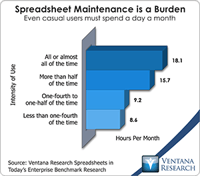Host Analytics has introduced AirliftXL, a new feature of its cloud-based financial performance management (FPM) suite that enables its software to translate users’ spreadsheets into the Host Analytics format. I find it significant in three respects. First, it can substantially reduce the time and resources it takes for a company to go live in adopting the Host Analytics suite, lowering the cost of implementation and accelerating time to value. Second, it enables Host Analytics users who have...
Read More
Topics:
Modeling,
Office of Finance,
Reporting,
closing,
Consolidation,
Controller,
Host Analytics,
Operational Performance,
Analytics,
Business Analytics,
Business Performance,
Cloud Computing,
Financial Performance,
Workforce Performance,
CFO,
Financial Performance Management,
FPM
Host Analytics has added new analytics and reporting resources to its cloud-based performance management suite. Business Analytics will offer a broad set of built-in analytics and reporting capabilities or, for companies with an existing business intelligence infrastructure (from vendors such as IBM, Infor, Oracle or SAP), the option of a self-service approach. I believe these new analytics and reporting capabilities give companies considering only on-premises performance management deployments...
Read More
Topics:
Planning,
Sales Performance,
Reporting,
Budgeting,
closing,
Consolidation,
Host Analytics,
XBRL,
Operational Performance,
Analytics,
Business Analytics,
Business Collaboration,
Business Mobility,
Business Performance,
Cloud Computing,
Financial Performance,
Workforce Performance,
Data,
benchmark,
Decision Hub,
Financial Performance Management,
SEC
Host Analytics is taking advantage of one of the inherent advantages that vendors of software as a service (SaaS) have compared to on-premises ones: It’s easier for them to offer their customers data services and shared data repositories. The company’s Decision Hub has been available since last summer. Although it doesn’t break new ground, it is a solid offering of this type and its value should be considered in any evaluation of Host’s offering.
Read More
Topics:
Planning,
Sales Performance,
Reporting,
Budgeting,
closing,
Consolidation,
Host Analytics,
Operational Performance,
Business Analytics,
Business Collaboration,
Business Performance,
Cloud Computing,
Financial Performance,
Workforce Performance,
Data,
benchmark,
Decision Hub,
Financial Performance Management,
SEC
Most large corporations have embraced some form of “performance management” software – perhaps even multiple forms – including business analytics to help create key performance indicators, reporting systems for graphically presenting information in a useful context (such as dashboards, scorecards or a recurring performance report) as well as planning systems to create budgets and forecasts or handle reviews. These sorts of systems become rarer as the size of the organization gets smaller. One...
Read More
Topics:
Financial Close,
Host Analytics,
Business Performance,
Financial Performance,
Financial Performance Management










